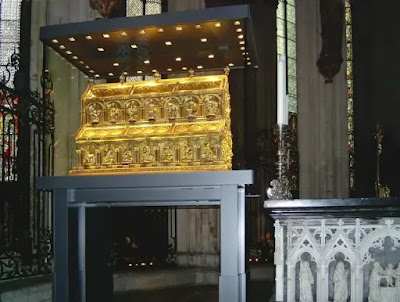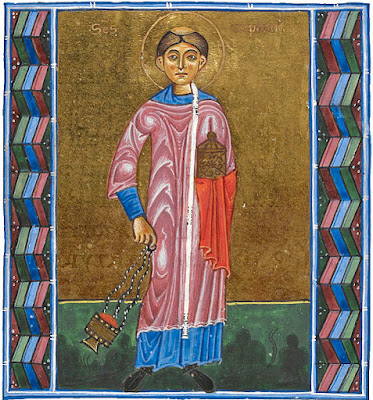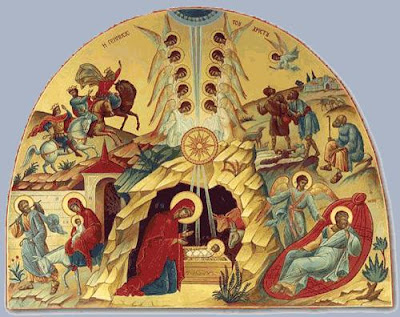December 31, 2019
Christmas, the Most Moving Feast
Saint Kyriakos of Bisericani (+ 1660)
 |
| St. Kyriakos of Bisericani (Feast Day - October 1 and December 31) |
Life of Saint Theophylact, Archbishop of Ochrid and Bulgaria
December 30, 2019
Saint Joseph the Betrothed Resource Page
 |
| St. Joseph the Betrothed (Feast Day - Sunday After Christmas) |
As her sole elected guardian.
Synaxarion for Joseph the Betrothed, James the Brother of God and David the Prophet
Sunday After Christmas: Joseph the Betrothed, James the Adelphotheos and King David
The Sunday After the Nativity of Christ
A Homily on the Righteous Joseph
The Silence of Joseph
Saint Amphilochios Makris and the Kathisma of Saint Joseph the Betrothed on the Island of Patmos
The Church of Saint Joseph the Betrothed and Saint Photini in Evosmos of Thessaloniki
A Chapel in Cyprus Dedicated to Saint Joseph the Betrothed
A Church in Crete Dedicated to Saint Joseph the Betrothed
December 29, 2019
A 14th Century Fresco from Mount Athos of Saint Joseph the Betrothed
King Herod's Slaughter of the Innocent Infants (St. Nikolai Velimirovich)
Sunday After Christmas: Epistle and Gospel Reading
Joseph the Betrothed, James the Brother of God
and David the Prophet and King
Psalm 67.35,26
God is wonderful among his saints.
Verse: Bless God in the congregations.
Exaposteilarion and Doxastikon of the Sixth Resurrection Eothinon Gospel for Sunday Matins
December 28, 2019
The Symbolism of the Three Gifts of the Magi
The Distributed Gifts of the Three Magi in Mount Athos
The Relics of the Three Magi
| Crowned Skulls of the Three Magi |
 |
| Marble sarcophagus of St. Eustorgius in Milan |
 |
| Shrine of the Three Kings |
December 27, 2019
The Divine Economy According to Saint Maximos the Confessor
The Post-Nativity Cappadocian Liturgical Calendar in 380 A.D.
Saint Stephen the Protomartyr: Epistle and Gospel Reading
December 27th
Psalm 18.4,1
Their voice has gone out into all the earth.
Verse: The heavens declare the glory of God.
December 26, 2019
The Manifestation of God’s Infinite Love
Synaxis of the Theotokos: Epistle and Gospel Reading
December 26th
Luke 1:46-48
My soul magnifies the Lord, and my spirit rejoices in God my Savior.
Verse: For he has regarded the humility of his servant.
Greek
Ἀδελφοί, ὁ ἁγιάζων καὶ οἱ ἁγιαζόμενοι, ἐξ ἑνὸς πάντες· διʼ ἣν αἰτίαν οὐκ ἐπαισχύνεται ἀδελφοὺς αὐτοὺς καλεῖν, λέγων, Ἀπαγγελῶ τὸ ὄνομά σου τοῖς ἀδελφοῖς μου, ἐν μέσῳ ἐκκλησίας ὑμνήσω σε. Καὶ πάλιν, Ἐγὼ ἔσομαι πεποιθὼς ἐπʼ αὐτῷ. Καὶ πάλιν, Ἰδοὺ ἐγὼ καὶ τὰ παιδία ἅ μοι ἔδωκεν ὁ θεός. Ἐπεὶ οὖν τὰ παιδία κεκοινώνηκεν σαρκός καὶ αἵματος, καὶ αὐτὸς παραπλησίως μετέσχεν τῶν αὐτῶν, ἵνα διὰ τοῦ θανάτου καταργήσῃ τὸν τὸ κράτος ἔχοντα τοῦ θανάτου, τοῦτʼ ἔστιν τὸν διάβολον, καὶ ἀπαλλάξῃ τούτους, ὅσοι φόβῳ θανάτου διὰ παντὸς τοῦ ζῇν ἔνοχοι ἦσαν δουλείας. Οὐ γὰρ δήπου ἀγγέλων ἐπιλαμβάνεται, ἀλλὰ σπέρματος Ἀβραὰμ ἐπιλαμβάνεται. Ὅθεν ὤφειλεν κατὰ πάντα τοῖς ἀδελφοῖς ὁμοιωθῆναι, ἵνα ἐλεήμων γένηται καὶ πιστὸς ἀρχιερεὺς τὰ πρὸς τὸν θεόν, εἰς τὸ ἱλάσκεσθαι τὰς ἁμαρτίας τοῦ λαοῦ. Ἐν ᾧ γὰρ πέπονθεν αὐτὸς πειρασθείς, δύναται τοῖς πειραζομένοις βοηθῆσαι.
The Early Christian Veneration of the Mother of God in Rome
The Orthodox Doctrine of the Virgin Mary as the Mother of God
December 25, 2019
On the Incarnation of the Word (St. Symeon the New Theologian)
The Incarnation of God: The Cause of Man's Deification (Archimandrite George Kapsanis)
The Incarnation and Redemption (Fr. George Florovsky)
Eighth Homily of Saint Leo the Great on the Nativity of Christ
Nativity of Christ: Epistle and Gospel Reading
Matins Gospel Reading
December 24, 2019
Three Magi Resource Page
The Magi and Astrology
The Veneration of the Magi in Iconography
The Symbolism of the Three Gifts of the Magi
The Relics of the Three Magi
The Three Gifts of the Magi On Mount Athos
The Distributed Gifts of the Three Magi in Mount Athos
The Gifts of the Magi Brought to Aitoloakarnanias (Photos / Video)
Russians Come In Waves To Venerate the Gifts of the Magi (photos + videos)
More Than 150,000 Faithful Venerate the Gifts of the Magi ... So Far
Christmas Art and Iconography Resource Page
Origins of the Icon of the Nativity of Christ
The Veneration of the Magi in Iconography
Two Cypriot Icons of the Nativity of Christ
The Controversy Over the Bathing Scene in Nativity Icons of the Holy Mountain
A Byzantine Nativity Icon that Depicts a Belief in Witchcraft and the Evil Eye
Jesus Christ: The Reclining Lion of Judah
An Icon of Christ With an Earring
A Recent Appearance of the Theotokos in Bethlehem
The Miraculous Icon of the Most Holy Virgin of Bethlehem
The Heretical Icon of the "Holy Family"
Christmas Theological Reflections Resource Page
Patriarch Pavle of Serbia
Patriarch Pavle on the Holy Nativity of Christ
Archbishop Christodoulos of Athens and All Greece
The Last Christmas Message of the Late Archbishop Christodoulos of Greece
The Messiah in the Old and New Testaments
Christmas - the Capital of Feasts
The Divine Kenosis
A Message To Heaven and a Message From Heaven
Christmas Christology: An Interview with Metropolitan Hierotheos of Nafpaktos
Christ Was Born Not to Establish a New Religion
The Birth of Christ Celebrates the End of the Sickness of Religion
Archimandrite Epiphanios Theodoropoulos
Archimandrite George Kapsanis
Awaiting Christmas (Archim. George Kapsanis)
The Incarnation of God: The Cause of Man's Deification (Archimandrite George Kapsanis)
The Manifestation of God’s Infinite Love
Archimandrite Ephraim of Vatopaidi
The Incarnation of God as the Opposite to Today’s Sinfulness
Archimandrite Elisaios of Simonopetra
Christmas, the Most Moving Feast
Archimandrite Chrysostomos Papathanasiou
Christianity, the Light of Humanity
Archimandrite Iakovos Kanakis
"Undecorating" the Christmas Tree
Father George Florovsky
The Incarnation and Redemption (Fr. George Florovsky)
Father George Metallinos
The Truth About Christmas and the Myth-Making of Christmas
Father George Dragas
Lecture On the Incarnation (Fr. George Dragas)
Father Cherubim Veletza
Have You Prepared Your Manger?
Father Haralambos Papadopoulos
The Least Who Yearn To Become Mangers
Why Was Jesus Born In Bethlehem?
What Does "Peace on Earth, Good Will Toward Men" Mean?
Comparing the First and Second Coming of Christ
The Birth of John the Baptist and the Summer Solstice
Basil Skiadas
God Upon the Earth
Alexis Alexadrou
Finding Christmas
Jeremy Lott
The Case Against the Case Against the Virgin Birth
Evangelia
Christmas... What is Missing?
Stephen Beale
The Incarnation: God’s Covert Strike Against Satan
Michael Hansen
Incarnation & New Creation
Lori Harfenist
Does Christmas Have Anything To Do With Jesus?
Other
No Room In The Inn? Born In A Manger?
A Resource Page on the Nativity of Christ in the Church Fathers, Saints and Teachers
General
Orthodox Christmas Reflection (1)
Orthodox Christmas Reflection (2)
Orthodox Christmas Reflection (3)
Why Jesus Came Into the World
The Patristic Understanding of the Virgin Birth of Christ
Did Christ Have A Fallen Human Nature?
The Erythraean Sibyl and Her Prophetic Acrostic Concerning the Coming of Christ
All The Saints Gather To Worship The Incarnate God








































